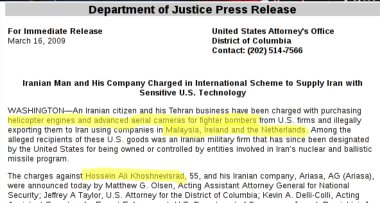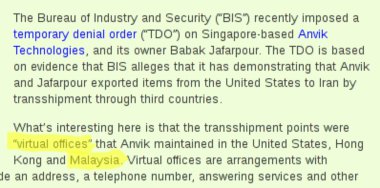The Home Minister, trying to brush aside questions on Wikileaks and the clandestine Iran arms trade, has added a twist to the matter by claiming it to be “a new issue” that must be discussed among officials. He’s wrong. Gun-running is an old, old issue.
It’s as old as the Moro rebellion in the southern Philippines; as old as the Palestinian struggle; and as old as the Pattani succession movement in southern Thailand. In fact it’s as old as piracy in the waters of the South-east Asian archipelago.
 On the world security agenda today are the two biggest forms of gun-running: nuclear proliferation (the development of nuclear weapons) and the development of offensive ballistic missile capabilities.
On the world security agenda today are the two biggest forms of gun-running: nuclear proliferation (the development of nuclear weapons) and the development of offensive ballistic missile capabilities.
You can’t get guns bigger than a ballistic missile and a nuclear bomb.
Iran and North Korea have both been strongly suspected of developing nuclear weapons as well as offensive missiles; the latest Cablegate leaks of US diplomatic cables have shown the depth of concern and anger in many countries with Iran’s ambitions.
Yet companies based in Malaysia have been entangled in the nuclear arms and military black markets for quite a while, and Malaysian facilities used to further this dangerous business.
Public awareness has only slowly increased in the six years since the Scomi group was exposed as having manufactured and shipped to Libya components to be used in centrifuges for enriching uranium, the nuclear fuel for power plants as well as nuclear weapons.
Since then, US arrests of Iranian arms dealers has exposed the use of Malaysian and Malaysian-based front companies, freight forwarders, and KL International Airport as a transshipment point.
A research group in the US has said Malaysia is favoured by Iranian arms dealers because of the lack of export controls — particularly laxity over the use of false end-user certificates, which determines whether arms can be shipped under international law.
None of that is “new”, except perhaps among those in the Malaysian public who faithfully swallow a diet of rah-rah feel-good government press releases. The only difference is that perhaps public interest is now being aroused by the fuss over the latest Wikileaks exposures.
But what has the Malaysian government done about illegal arms trading since Scomi six years ago?
On Thursday, Hishammuddin, the home minister, said he would await a briefing by federal police headquarters, and consultation with foreign diplomatic partners and intelligence agencies.
“On cross borders matters like this, we need to involve Malaysian Communications and Multimedia Commission (MCMC) and Wisma Putra (Foreign Ministry) in terms of our (foreign policies) concerning our bilateral and multilateral ties (with foreign countries),” Malaysiakini quotes Hishammuddin as saying to reporters at Parliament.
“There are Malaysian companies involved, but I cannot say unless I discuss with relevant parties first. It is a new issue and the effect is serious, let us handle this in the proper way and work with the relevant parties.”
It is difficult to believe that Hishammudin could say that with a straight face, considering the background facts.
- In 2004, the Scomi nuclear scandal came to light, involving nuclear profileration to Libya, Pakistan’s nuclear scientist AQ Khan, and his associate BSA Tahir, who was briefly detained under the Internal Security Act and released in 2008. He has since sued his former Scomi partners.
In March last year Hosseinali Khoshnevisrad, the man said to be the owner of Skylife Worldwide named in the leaked February State Department cable on Sunday, was arrested and charged in San Francisco. Malaysian companies were named in the charge.
- Last week, US agents took action against a Singapore-based company for transshipment of arms to Iran. “Virtual offices” in Malaysia were said to be involved.
 The FBI’s announcement last year on Hoessin’s arrest
The FBI’s announcement last year on Hoessin’s arrestAll this information is in the public sphere. None of it is secret — and has probably already been shared with Malaysian government and intelligence officials. And essentially there’s nothing new, just names of different people and places.
So what has the Malaysian government really been doing?
Hishammudin now talks about bringing in the Multimedia Commission, the Internet regulator. Why? It is not the Internet or coverage of one leaked cable that is the problem. The problem is of Malaysian complicity and connivance in the international nuclear weapons and military arms black markets.
Many people around the world are frightened by the prospect of more nuclear bombs and missiles in the hands of aggressive countries.
But maybe Hishammuddin and the Cabinet are not.
Maybe Hishammuddin and the Cabinet are more afraid of what Malaysian voters will think when people find out the government really did very little while the merchants of death went about their deadly business.
courtesy of uppercaise







No comments:
Post a Comment
Note: Only a member of this blog may post a comment.